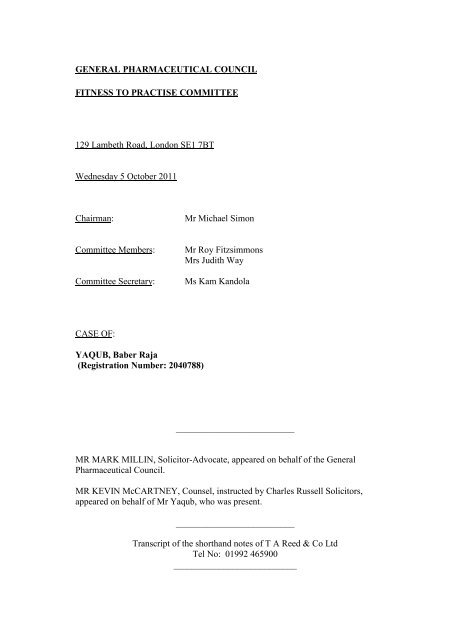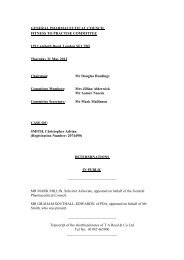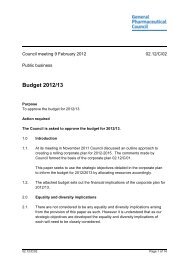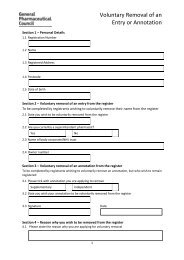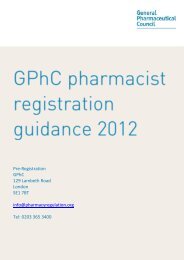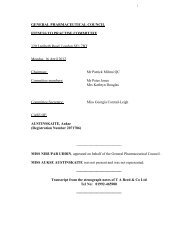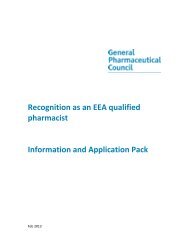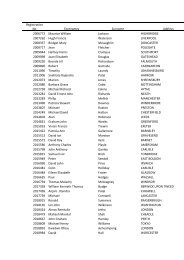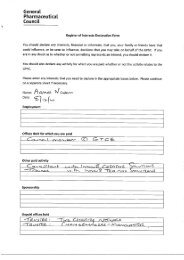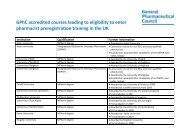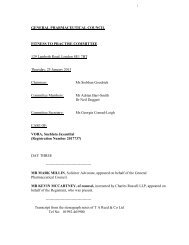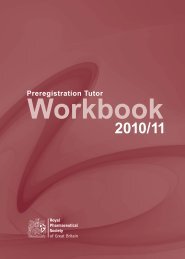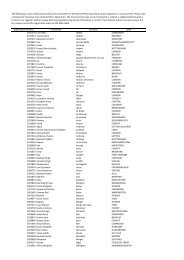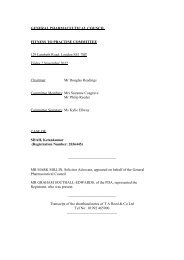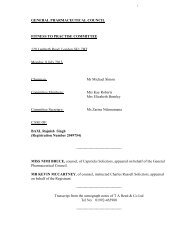GENERAL PHARMACEUTICAL COUNCIL FITNESS TO PRACTISE ...
GENERAL PHARMACEUTICAL COUNCIL FITNESS TO PRACTISE ...
GENERAL PHARMACEUTICAL COUNCIL FITNESS TO PRACTISE ...
Create successful ePaper yourself
Turn your PDF publications into a flip-book with our unique Google optimized e-Paper software.
<strong>GENERAL</strong> <strong>PHARMACEUTICAL</strong> <strong>COUNCIL</strong><br />
<strong>FITNESS</strong> <strong>TO</strong> <strong>PRACTISE</strong> COMMITTEE<br />
129 Lambeth Road, London SE1 7BT<br />
Wednesday 5 October 2011<br />
Chairman:<br />
Mr Michael Simon<br />
Committee Members:<br />
Committee Secretary:<br />
Mr Roy Fitzsimmons<br />
Mrs Judith Way<br />
Ms Kam Kandola<br />
CASE OF:<br />
YAQUB, Baber Raja<br />
(Registration Number: 2040788)<br />
__________________________<br />
MR MARK MILLIN, Solicitor-Advocate, appeared on behalf of the General<br />
Pharmaceutical Council.<br />
MR KEVIN McCARTNEY, Counsel, instructed by Charles Russell Solicitors,<br />
appeared on behalf of Mr Yaqub, who was present.<br />
__________________________<br />
Transcript of the shorthand notes of T A Reed & Co Ltd<br />
Tel No: 01992 465900<br />
___________________________
I N D E X<br />
Page<br />
Determination 1<br />
Determination 13<br />
PLEASE NOTE: Copies printed from email may differ in formatting and/or page<br />
numbering from hard copies
A<br />
(The Committee resumed in camera at 9.30 am and<br />
returned into open session at 11.39 am)<br />
D E T E R M I N A T I O N<br />
B<br />
C<br />
D<br />
E<br />
F<br />
G<br />
THE CHAIRMAN: This is the impairment stage of proceedings brought against Mr Baber<br />
Raja Yaqub a pharmacist first registered with the Royal Pharmaceutical Society of Great<br />
Britain on 15 December 1992 and subsequently registered with the General Pharmaceutical<br />
Council when it came into existence under the registration number 2040788.<br />
At the beginning of the hearing, the registrant formally made admissions to all of the heads<br />
of charge in the allegation. In brief, these relate to failures to maintain accurate and up-todate<br />
controlled drugs registers for a number of different drugs, and in respect of one head<br />
of charge, paragraph 7, Mr Yaqub was said to have supplied methadone otherwise than in<br />
accordance with the relevant script. The first head of charge is dated February 2006 and<br />
the last relates to December 2008. It is worthy of note that there are two distinct strands to<br />
the allegations, one relating to controlled drugs in general (which I will refer to in future as<br />
CDs) and one relating to methadone specifically.<br />
By way of background in relation to the allegations, Mr Yaqub was the pharmacist in<br />
charge of Bruntons Chemist, 240 Earls Court Road, London SW5 9AA. Yaqub Pharmacy<br />
Ltd, which is the corporate owner of Bruntons Chemist, is owned by Mr Yaqub. He is the<br />
superintendent and director of that organisation. At all material times he was the<br />
pharmacist in charge of Bruntons Pharmacy. On 24 November 2008, DC Mark Smith,<br />
Controlled Drugs Liaison Officer of the Metropolitan Police, informed the Society (which<br />
was then the regulator) that he had visited Bruntons Chemist on 30 April 2008 and asked<br />
Mr Yaqub to inspect the controlled drugs registers. DC Smith advised that Mr Yaqub was<br />
unable to show him the CD registers, saying that his accountant had accidentally taken<br />
them on 24 April 2008, along with some other documentation. DC Smith stated that<br />
Mr Yaqub assured him that he would retrieve the registers that night and return them to the<br />
pharmacy. DC Smith also stated that he contacted Mr Yaqub again on 1 May and 6 May<br />
2008 but that the registers had not yet been returned.<br />
H<br />
T A REED<br />
& CO LTD<br />
01992-465900<br />
1
A<br />
B<br />
C<br />
D<br />
E<br />
F<br />
G<br />
H<br />
T A REED<br />
& CO LTD<br />
01992-465900<br />
On 12 May 2008 Sharon Monks, Society Inspector, visited Bruntons Chemist to undertake<br />
a routine inspection. During the inspection Ms Monks asked Mr Yaqub for the CD<br />
registers and was informed that he did not have them as his accountant had removed them<br />
by accident. Ms Monks believes she had seen a CD register in the basement and asked<br />
Mr Yaqub to get it for her. She found that it was part of a register and contained many<br />
gaps between entries and discrepancies in the running balances. Ms Monks removed the<br />
section of the CD register that was available and she returned again to the pharmacy on<br />
22 May 2008 and removed some further sections of the CD register that Mr Yaqub had<br />
retrieved. On 28 August 2008 Ms Monks provided the registers to DC Smith to enable the<br />
police to further investigate the matter.<br />
On 17 November 2008 the police interviewed Mr Yaqub under caution. During that<br />
interview Mr Yaqub made admissions concerning the CD registers. He stated that he had<br />
voluntarily stopped supplying schedule 2 drugs (that is the methadone in this case)<br />
approximately a year before.<br />
On 24 November 2008 DC Smith also informed the Society that the police had decided not<br />
to take legal proceedings against Mr Yaqub because (i) he had no previous warnings; (ii)<br />
there was no evidence of unlawful supply or indeed of diversion; (iii) there was no risk to<br />
public health involved; and (iv) he had adopted new standard operating procedures (SOPs).<br />
The police also took into account that Mr Yaqub accepted that he had fallen behind in<br />
maintaining the CD registers during 2006 and 2007, had left gaps in case he had missed<br />
entries, and that not recording all supplies of drugs had led to imbalances in his records.<br />
Further, the police took into consideration that Mr Yaqub had voluntarily stopped<br />
dispensing the schedule 2 CDs for a year so that he could put safeguards in place to<br />
prevent a recurrence of the situation.<br />
On 17 December 2008 DC Smith returned the CD registers to Ms Monks together with<br />
prescription evidence and a copy of the police interview which is in our bundle. On<br />
7 January 2009 Ms Monks visited Bruntons Chemist to carry out a follow-up CD<br />
inspection. At that stage, she found two missing entries for 13 and 15 December 2008<br />
relating to Seconal capsules, which are reflected in the final head of charge in the<br />
allegation.<br />
2
A<br />
B<br />
C<br />
D<br />
E<br />
F<br />
G<br />
H<br />
T A REED<br />
& CO LTD<br />
01992-465900<br />
In his written evidence Mr Yaqub explained that having worked as a pharmacist for other<br />
employers until 2006, Bruntons was the first pharmacy that he had purchased in his own<br />
right. He took over a going concern with existing members of staff. He said this in his<br />
statement at paragraph 10:<br />
“The proprietors of the Pharmacy were a partnership. There was a dispute between<br />
the partners about who the Pharmacy should be sold to. One of the effects of this<br />
dispute was that I was not allowed to work in the Pharmacy before I purchased it.<br />
I therefore did not get an opportunity before the purchase to understand the volume<br />
and type of work in the Pharmacy, what level of support staff there was, the<br />
training of those staff, how the staff worked in the Pharmacy, its procedures and the<br />
level and type of information technology in use.<br />
11. On day one of my ownership I was therefore up against a barrage of patients<br />
who wanted prescriptions dispensed and with the staff... that I inherited from the<br />
previous owners. The staff had no experience of sales or giving advice. It was<br />
evident that most of them were employed to look after the photographic<br />
department, which at the time was processing films. They had a poor grasp of<br />
English and were not trained appropriately for the pharmacy counter... The overall<br />
effect was that the staff did not work in a way that I would have liked.<br />
12. There were other issues which I discovered when I started working at the<br />
Pharmacy and which affected the ability of me and the other staff to operate<br />
effectively. For example:<br />
12.1 Bottled water was used for reconstituting antibiotics... However, there<br />
was no system for recording when the bottle had been filled and,<br />
consequently, no way of verifying that the water in the bottle was fresh.<br />
12.2 The [pharmacy] dispenser... did not speak English very well.<br />
12.3 The computer system was outdated and had no association with the<br />
most commonly used software and hardware on the market – it had a very<br />
slow processor and a very slow 9-pin dot-matrix printer.... The computer<br />
3
A<br />
did not have a proper modem so orders had to be telephone to Colorama.<br />
The system was stifling.<br />
12.4 ...<br />
B<br />
C<br />
12.5 The previous owners had made no effort to comply with the new<br />
pharmacy contract which was introduced in April 2005. None of the<br />
guidelines for essential services had been auctioned and no clinical<br />
governance requirements had been met.<br />
12.6 Waste medication had not been collected for seven years and was<br />
being stored in the basement.<br />
12.7 ...<br />
D<br />
12.8 There was no fire alarm and the fire extinguishers had not been tested<br />
for 11 years.<br />
12.9 The Pharmacy did not have any Standard Operating Procedures.<br />
E<br />
F<br />
G<br />
12.10 There was no staff training on giving health advice.<br />
12.11 The food fridge was used for storing medication.<br />
13. The practical effect of all these issues was that the dispensing work was not<br />
done efficiently and effectively by staff. This placed a heavy burden on me as<br />
the pharmacist because I did not have suitable support from existing staff, and there<br />
were no family members who could help out. I was also still managing the<br />
aquarium shop...”<br />
I interpose here to point out that Mr Yaqub makes reference to this earlier on in his<br />
statement, that he owned another business which was in fact an aquarium shop at the same<br />
time.<br />
His statement continues:<br />
H<br />
T A REED<br />
& CO LTD<br />
01992-465900<br />
4
A<br />
B<br />
C<br />
“… (with the staff that I had left there) whilst being the full-time pharmacist at<br />
the Pharmacy. I was attending the aquarium store in the evening after closing the<br />
pharmacy.<br />
14. Once the extent of the problems became apparent, I tried to resolve the issues<br />
and prioritised the issues which I believed were most pressing. For example, new<br />
fridges were ordered, a new computer system (Link) was installed, new reference<br />
books were ordered, standard operating procedures were initiated and staff were<br />
trained on their roles from scratch. I also recruited additional members of staff<br />
who had appropriate training and experience of working in a pharmacy.<br />
Specifically in relation to the supply of controlled drugs from the pharmacy, Mr Yaqub<br />
said this in his statement at paragraph 15 and onwards:<br />
D<br />
E<br />
F<br />
G<br />
H<br />
T A REED<br />
& CO LTD<br />
01992-465900<br />
“Almost as soon as I purchased the Pharmacy, a representative from the local Drug<br />
Dependency Unit asked me if the Pharmacy would take on methadone patients<br />
because the nearest pharmacy, Boots, was not taking any more patients and the<br />
DDU said that there was a need in the neighbourhood for that service. From April<br />
2006 we started providing services to drug misusers and had 8 patients initially.<br />
We also started participating in a needle exchange scheme.<br />
16. Almost immediately I started to fall behind with making entries in the CD<br />
register and the general administration of the business suffered. For example, when<br />
I dispensed methadone I would not make the entry immediately, intending to do it<br />
later. I then did not complete the entry, so when the next prescription came in<br />
I could not include it in the register because I had not entered previous supplies. It<br />
is apparent to me now that I had bitten off more than I could chew. The problem<br />
snowballed and I did not know who to ask to sort things out.<br />
17. I felt afraid that I had fallen behind with the registers and I could not see how<br />
to get back on top of it. I therefore decided in around September 2007 that we<br />
would have to stop supplying methadone because I had realised that I would not be<br />
able to get back on top of the records if we were also continuing to make supplies.<br />
It was my intention not to start dispensing methadone again until I had found<br />
a workable system for the service and had trained all the staff.<br />
5
A<br />
B<br />
C<br />
D<br />
E<br />
F<br />
G<br />
H<br />
T A REED<br />
& CO LTD<br />
01992-465900<br />
18. Once I ceased making further supplies of methadone, I started to attempt to put<br />
the CD registers together and to complete the missing entries using copies of<br />
prescriptions and invoices that I had kept. I had every intention to put it all in<br />
order. However, I accept that the entries contained within the Council’s bundle<br />
show that the CD registers were not all up-to-date by May 2008. For example, the<br />
CD registers still had a number of gaps which I had left where, for example, I had<br />
put in entries of stock received and intended at a later date to put in the supplies<br />
made to patients.”<br />
As we indicated earlier, Mr Yaqub made what are properly described as full admissions in<br />
his interview with the police and, indeed, within these proceedings. Mr McCartney who<br />
appears on his behalf confirmed that Mr Yaqub accepts that the facts he has admitted<br />
amount to the type of serious misconduct about which we must be satisfied in the first<br />
stage of our considerations of impairment of fitness to practise. That seems to us to be<br />
an entirely proper recognition of the nature of the failings in his clinical practice.<br />
The oral evidence we heard from the inspector Ms Monks and from the registrant centred<br />
on the question of the extent to which there had been remediation of that misconduct.<br />
Ms Monks was speaking to a report from a colleague of hers in the inspectorate who<br />
visited Bruntons Pharmacy on 24 November 2010 and who made recommendations for<br />
additional clarity in respect of the SOPs for controlled drugs and for the supply of<br />
methadone. Having said that there had been improvements but that Mr Yaqub was not “all<br />
the way there”, she accepted that the deficiencies in the SOPs were about describing the<br />
process for making a recording, and it was not suggested that the recording itself was not<br />
being made. Ms Monks also said that the versions of the SOPs from 2010 and 2011<br />
seemed to address this lacuna. She insisted that a couple of other points in the SOPs<br />
needed to be clearer to satisfy her fully. She also indicated that best practice suggested that<br />
there should be a weekly balance check on all controlled drugs and not the monthly one<br />
referred to in the general SOP.<br />
In his oral evidence Mr Yaqub explained that he was unable to address the issues around<br />
the controlled drugs registers because there was so much else that needed his attention. He<br />
expressed a clear readiness to amend the SOPs further to reflect the comments made by<br />
6
A<br />
B<br />
C<br />
D<br />
E<br />
F<br />
G<br />
H<br />
T A REED<br />
& CO LTD<br />
01992-465900<br />
Ms Monks. He agreed that he had been registered for a substantial period of time prior to<br />
taking on Bruntons and that he was aware of the requirements of the misuse of drugs<br />
legislation. He also agreed that he should have prioritised the maintenance of the CD<br />
registers. He said that he thought “a lot of things would have been done differently with<br />
hindsight.”<br />
As to the issue of the balance checks, he confirmed that there is a weekly check on<br />
methadone and a monthly check on the one other controlled drug currently being<br />
dispensed, Seconal, due to the fact that it is only being supplied on a monthly basis at<br />
present. If the situation changed and more controlled drugs were being dispensed, as was<br />
the case in 2006 and 2007, then he would institute weekly balance checks for all CDs.<br />
At the time of the clinical failures he had felt there was nowhere to turn for advice, but<br />
now he would approach the Society, the National Pharmacists Association or the Local<br />
Practitioner Committee. He had invested a significant sum in the automated dispenser for<br />
methadone (known as MethaMeasure) which will record electronically the dispensing of<br />
that drug, although new supplies will have to be entered manually as before.<br />
Given his concession on misconduct, our task at this point in the proceedings is to<br />
determine whether or not Mr Yaqub’s fitness to practise is currently impaired. This issue,<br />
of course, is not a simple matter but it is one for which guidance is contained in a number<br />
of High Court decisions.<br />
In the case of Cohen v General Medical Council [2008] EWHC (Admin) Silber J stated at<br />
paragraph 62 and onwards:<br />
“Any approach to the issue of whether a doctor’s fitness to practice should be<br />
regarded as “impaired” must take account of “the need to protect the individual<br />
patient, and the collective need to maintain confidence in the profession as well as<br />
declaring and upholding proper standards of conduct and behaviour of the public<br />
in their doctors and that public interest includes amongst other things the<br />
protection of patients, maintenance of public confidence in the profession”. In my<br />
view, at stage 2 when fitness to practice is being considered, the task of the Panel is<br />
to take account of the misconduct of the practitioner and then to consider it in the<br />
7
A<br />
light of all the other relevant factors known to them in answering whether by reason<br />
of the doctor’s misconduct, his or her fitness to practice has been impaired…<br />
B<br />
63. I must stress that the fact that the stage 2 is separate from stage 1 shows that it<br />
was not intended that every case of misconduct found at stage 1 must automatically<br />
mean that the practitioner’s fitness to practice is impaired.<br />
C<br />
D<br />
E<br />
F<br />
64. There must always be situations in which a Panel can properly conclude that<br />
the act of misconduct was an isolated error on the part of a medical practitioner and<br />
that the chance of it being repeated in the future is so remote that his or her fitness<br />
to practice has not been impaired. Indeed the Rules have been drafted on the basis<br />
that once the Panel has found misconduct, it has to consider as a separate and<br />
discrete exercise whether the practitioner’s fitness to practice has been impaired…<br />
65. Indeed I am in respectful disagreement with the decision of the Panel which<br />
apparently concluded that it was not relevant at stage 2 to take into account the fact<br />
that the errors of the appellant were “easily remediable”. I concluded that they did<br />
not consider it relevant at this stage because they did not mention it in their findings<br />
at stage 2 but they did mention it at stage 3. That fact was only considered as<br />
significant by the Panel at a later stage when it was dealing with sanctions. It must<br />
be highly relevant in determining if a doctor’s fitness to practice is impaired that<br />
first his or her conduct which led to the charge is easily remediable, second that it<br />
has been remedied and third that it is highly unlikely to be repeated. These are<br />
matters which the Panel should have considered at stage 2 but it apparently did not<br />
do so.”<br />
G<br />
H<br />
T A REED<br />
& CO LTD<br />
01992-465900<br />
We remind ourselves that later authorities have adopted Silber J’s formulation, save for<br />
emphasising that the assessment of fitness to practise must be undertaken relative to the<br />
circumstances as they are at the date of hearing.<br />
In the case of Cheatle v General Medical Council [2009] EWHC 645 (Admin) Cranston J<br />
stated:<br />
8
A<br />
B<br />
C<br />
D<br />
E<br />
F<br />
G<br />
H<br />
T A REED<br />
& CO LTD<br />
01992-465900<br />
“Impairment of fitness to practise” is a somewhat elusive concept. In her fifth<br />
Shipman Report… Dame Janet Smith opined that its advantage was that it was<br />
capable of embracing the range of problems which the GMC habitually<br />
encountered, misconduct (including criminal conduct), deficient professional<br />
performance and adverse health and determinations by other regulators. However,<br />
it was unclear what it meant and even greater difficulties would be encountered<br />
with the concept than with those of “serious professional misconduct” and<br />
“seriously deficient performance”… Dame Janet helpfully set out the reasons why<br />
a decision-maker might conclude that a doctor was unfit to practise or that his<br />
fitness to practise was impaired. Four reasons recurred in the examples she had<br />
examined:<br />
“… (a) that the doctor presented a risk to patients, (b) that the doctor had<br />
brought the profession into disrepute, (c) that the doctor had breached one<br />
of the fundamental tenets of the profession and (d) that the doctor’s integrity<br />
could not be relied upon.”<br />
In CHRE v Nursing & Midwifery Council and Grant [2011] EWHC 927 (Admin) Cox J<br />
said at paragraph 72 and onwards:<br />
“This need to have regard to the wider public interest in determining questions of<br />
impairment of fitness to practise was also referred to by Goldring J in R (on the<br />
Application of Harry) v. General Medical Council [2006] EWHC 3050 (Admin)<br />
and by Mitting J in Nicholas-Pillai, where he held that the Panel were entitled to<br />
take into account the fact that the practitioner had contested critical allegations of<br />
dishonest note-keeping, observing that:<br />
‘[19] In the ordinary case such as this, the attitude of the practitioner to the<br />
events which give rise to the specific allegations against him is, in principle,<br />
something which can be taken into account either in his favour or against<br />
him by the panel, both at the stage when it considers whether his fitness to<br />
practise is impaired, and at the stage of determining what sanction should be<br />
imposed upon him.’”<br />
9
A<br />
B<br />
C<br />
D<br />
E<br />
F<br />
G<br />
73. Sales J also referred to the importance of the wider public interest in assessing<br />
fitness to practise in Yeong v GMC [2009] EWHC 1923 (Admin), a case involving<br />
a doctor’s sexual relationship with a patient. Pointing out that Cohen was<br />
concerned with misconduct by a doctor in the form of clinical errors and<br />
incompetence, where the question of remedial action taken by the doctor to address<br />
his areas of weakness may be highly relevant to the question whether his fitness to<br />
practise is currently impaired, Sales J considered that the facts of Yeong merited<br />
a different approach. He upheld the submission of counsel for the GMC that:<br />
‘… Where a FTPP considers that the case is one where the misconduct<br />
consists of violating such a fundamental rule of the professional relationship<br />
between medical practitioner and patient and thereby undermining public<br />
confidence in the medical profession, a finding of impairment of fitness to<br />
practise may be justified on the grounds that it is necessary to reaffirm clear<br />
standards of professional conduct so as to maintain public confidence in the<br />
practitioner and in the profession. In such a case, the efforts made by the<br />
medical practitioner in question to address his behaviour for the future may<br />
carry very much less weight than in a case where the misconduct consists of<br />
clinical errors or incompetence.’<br />
74. I agree with that analysis and would add this. In determining whether<br />
a practitioner’s fitness to practise is impaired by reason of misconduct, the relevant<br />
panel should generally consider not only whether the practitioner continues to<br />
present a risk to members of the public in his or her current role, but also whether<br />
the need to uphold proper professional standards and public confidence in the<br />
profession would be undermined if a finding of impairment were not made in the<br />
particular circumstances.”<br />
At paragraph 116 of her judgment, Cox J also said:<br />
“When considering whether fitness to practise is currently impaired, the level of<br />
insight shown by the practitioner is central to a proper determination of that issue.”<br />
H<br />
T A REED<br />
& CO LTD<br />
01992-465900<br />
10
A<br />
B<br />
C<br />
D<br />
E<br />
F<br />
G<br />
H<br />
T A REED<br />
& CO LTD<br />
01992-465900<br />
Mr Millin for the Council submitted, in essence, that whilst there had been some level of<br />
remediation in this case, it was incomplete, and that, bearing in mind the dicta of Grant,<br />
a finding of impairment was “inevitable”.<br />
In comprehensive submissions on the registrant’s behalf, Mr McCartney emphasised the<br />
level of insight shown by Mr Yaqub. He drew a distinction with Grant on its facts and<br />
urged us to approach the matter very much from the perspective of the cases of Cohen and<br />
Cheatle. The combination of the passage of time, insight and remediation should, he said,<br />
lead to a finding that Mr Yaqub’s present fitness to practise is not impaired. This case did<br />
not involve an innate character flaw and did not relate to clinical incompetence. He<br />
analysed the outstanding areas of concern addressed in the oral evidence and urged us to be<br />
satisfied that these should not weigh heavily in our consideration.<br />
He acknowledged that the registrant had obviously got himself into difficulties at the time<br />
and had not appreciated that there were organisations to which he could turn in order to<br />
help him out of his predicament. Mr McCartney suggested that the Committee, in finding<br />
no impairment, could still properly consider the giving of a warning.<br />
We have, of course, given very careful consideration to all of the evidence and everything<br />
that has been said by both representatives. We accept that there has undoubtedly been<br />
some remediation of the misconduct. There are more comprehensive SOPs in place.<br />
However, we were struck by the fact that even now Mr Yaqub seems to adopt a reactive<br />
rather than proactive approach to the controlled drugs aspect of his pharmacy practice.<br />
Whilst we understood entirely why the Seconal is only checked on a monthly basis, we<br />
were concerned that the relevant SOP, which should cover any reasonably predictable<br />
eventuality, did not even now contain a reference to the need for a weekly balance on those<br />
CDs that are dispensable frequently. Although that is not currently an issue, a thorough<br />
and properly thought through SOP would address this issue. This raises proper concern,<br />
both about the fullness of the remediation, without in any way questioning Mr Yaqub’s<br />
good intentions, but also about the extent to which we can properly be satisfied that the<br />
misconduct is “highly unlikely” to be repeated.<br />
There did not appear to us to be any clear explanation as to why maintenance of the CD<br />
registers was not prioritised when Mr Yaqub quite plainly knew the requirements and<br />
11
A<br />
B<br />
C<br />
D<br />
E<br />
understood their importance. These are fundamental and vitally important aspects of<br />
pharmacy practice, and we remain concerned that they existed over such an extended<br />
period of time and that no effective remedial action was taken during that time.<br />
Furthermore, a careful and full reading of Cohen does not seem to us to be inconsistent<br />
with the principle enunciated by Cox J in Grant that the nature and extent of the<br />
misconduct may lead to a finding of impairment based on the limbs of the public interest<br />
duty other than public protection. Silber J in Cohen refers to “an isolated error on the part<br />
of the practitioner”. Whilst, of course, this cannot be interpreted literally to encompass<br />
only what one might call one-off lapses in professionalism, we do not consider that it<br />
properly applies to the breadth of failures involved in this case over a period of nearly three<br />
years and relating to so many different CDs. Silber J specifically refers to the need to take<br />
account of “the collective need to maintain confidence in the profession as well as<br />
declaring and upholding proper standards of conduct and behaviour” when assessing<br />
fitness to practise.<br />
The public view of Mr Yaqub’s misconduct would not be, in our opinion, that these were<br />
just administrative errors but rather that the misconduct constituted serious failures in basic<br />
pharmacy practice as required by law, not just the relevant code of ethics, and that such<br />
failures extended over a wholly unacceptable period of time.<br />
Further, whilst no harm in fact resulted, such inadequacies had the very real potential at all<br />
times to become an issue of public protection. We have therefore concluded:<br />
F<br />
G<br />
H<br />
T A REED<br />
& CO LTD<br />
01992-465900<br />
(1) that despite Mr Yaqub’s commendable attempts at remediation he has not<br />
satisfied us overall that the risk of repetition reaches the benchmark of “highly<br />
unlikely”, and<br />
(2) in any event, the nature and extent of the misconduct is such that a finding of<br />
currently impaired fitness to practise is necessary to maintain the confidence of the<br />
public in the profession and to declare and uphold proper standards of conduct and<br />
behaviour within the profession.<br />
That concludes our determination at this stage.<br />
12
A<br />
(Later)<br />
(The Committee went in camera at 12.59 pm and<br />
returned into open session at 3.01 pm)<br />
B<br />
C<br />
D<br />
E<br />
F<br />
G<br />
H<br />
T A REED<br />
& CO LTD<br />
01992-465900<br />
D E T E R M I N A T I O N<br />
THE CHAIRMAN: Having found Mr Yaqub’s fitness to practise to be impaired, we now<br />
move to the question of the appropriate sanction, if any, to impose. We have had full<br />
regard to the Indicative Sanctions Guidance both in terms of the process we must adopt in<br />
reaching our conclusion on sanction and also the factors to take account of when choosing<br />
the appropriate level of sanction.<br />
We have borne in mind all three aspects of the public interest that are engaged in this case,<br />
as well as the principles of fairness and proportionality.<br />
We first considered taking no action and then a warning, but concluded that both of these<br />
outcomes would be insufficient to meet the concerns we highlighted in our earlier<br />
determination.<br />
Mr McCartney submitted that our concerns would be properly and adequately addressed by<br />
the imposition of conditions. We agree. The Indicative Sanctions Guidance identifies<br />
a number of factors in relation to the appropriateness of the imposition of conditions of<br />
practice and many of those are applicable to this registrant. In addition, we have taken<br />
account of the candour with which the registrant gave his evidence, which corroborates his<br />
level of insight and his willingness to improve his practice to a satisfactory and safe level.<br />
The gravamen of the misconduct and the concerns giving rise to the finding of impairment<br />
would be fully addressed through the following conditions, which will be in place for<br />
a period of 12 months:<br />
PR18: To make immediate contact with the Council’s inspectorate and to arrange<br />
one additional visit (over and above the anticipated annual inspection) during the<br />
period of these conditions, the cost of such visit to be borne by you, and to<br />
implement any recommendations made by the inspectorate.<br />
13
A<br />
B<br />
C<br />
PR19: To send copies, whether by post or electronically, of the controlled drugs<br />
registers for Bruntons Pharmacy to the Head of Inspections every month.<br />
PR21: To seek the immediate advice of the NPA in relation to your pharmacy<br />
practice in respect of controlled drugs and, in particular, in relation to the drafting<br />
of SOPs for controlled drugs and supply of methadone. Thereafter to send copies<br />
of the revised SOPs to the Council within three months.<br />
The Council is requested to monitor the registrant’s compliance with these conditions<br />
under the new procedures.<br />
That concludes our determination on sanction.<br />
MR McCARTNEY: Thank you very much.<br />
D<br />
MR MILLIN: Thank you, sir.<br />
THE CHAIRMAN: Thank you very much for your assistance, both of you.<br />
(The Committee adjourned at 3.05 pm)<br />
E<br />
F<br />
G<br />
H<br />
T A REED<br />
& CO LTD<br />
01992-465900<br />
14


